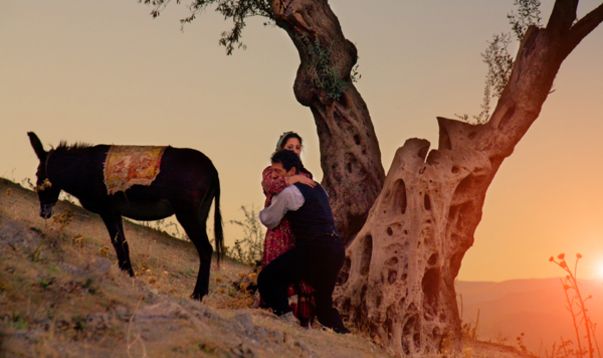Family Lessons and a Familiar Message
Yasemin Samdereli's Berlinale Competition entry ALMANYA is a feel-good immigration tale.

ALMANYA
The Yilmazes, a modern-day Turkish-German family, have their problems. Grandma Fatma is anxiously trying to get German citizenship for herself and her husband Hüseyin; granddaughter Canan has just learnt she is pregnant; her cousin Cenk is getting picked on at school. What better way to resolve these problems than a family trip to their Turkish homeland? This journey provides the setup for a story about immigration that wishes to say something about the specific experience of Turks who emigrated to Germany in the mid-twentieth century. Unfortunately, though, Yasemin Samdereli’s Berlinale Competition film ALMANYA (ALMANYA – WILLKOMMEN IN DEUTSCHLAND, Germany) is so riddled with clichés both at the level of its narrative construction and that of its thematic consideration of immigration that it loses sight of this aim: Turkey and Germany could as easily be Greece and Australia or China and the USA, so generic and unspecific does this story of immigration and ‘culture clash’ become.
The film moves between two periods in the Yilmaz family’s history. The family trip to Turkey occupies the present-day sections: as the three generations travel to the homeland together, the earthy simplicity of this orientalised Turkey helps to erode the conflicts and misunderstandings of their alienated Western lives. These parts of the film are disappointingly reliant upon Western stereotypes about the vitality and earthiness of the East (the fact that the director is herself of Turkish parentage does not absolve her film of such problems).
Much better are the flashback sections that show the family’s initial migration to Germany in the 1960s. Samdereli has fun playing with and gently mocking the conventions of the period film genre, most amusingly in the way she messes around with the different languages spoken (Turks speak in German, while Germans speak in a nonsense language that is as inaccessible to the audience as to the Yilmazes).
Samdereli handles aspects of the family’s initial adjustment to a new culture with great care – most touching is a scene that shows Hüseyin and Fatma’s children teaching their clueless parents how to properly celebrate Christmas. But such moments are in the minority. For the most part the film maintains a familiar and staggeringly rosy view of immigration: no cultural differences and hardships are too hard to overcome with a little hard work, and families can always be counted on to come together during hard times.
The film’s conclusion, showing the family receiving an award from Chancellor Merkel on behalf of hard-working immigrants across Germany, is particularly distressing in its whitewashing of the mercenary motivations of Western states in their promotion of the immigration of cheap labour. This dreadful ending leaves the spectator feeling they have just watched a piece of propaganda for the German government and its benevolent immigration policies, greatly undermining the film’s claim to be a serious consideration of the lives of immigrants.


301 Moved Permanently